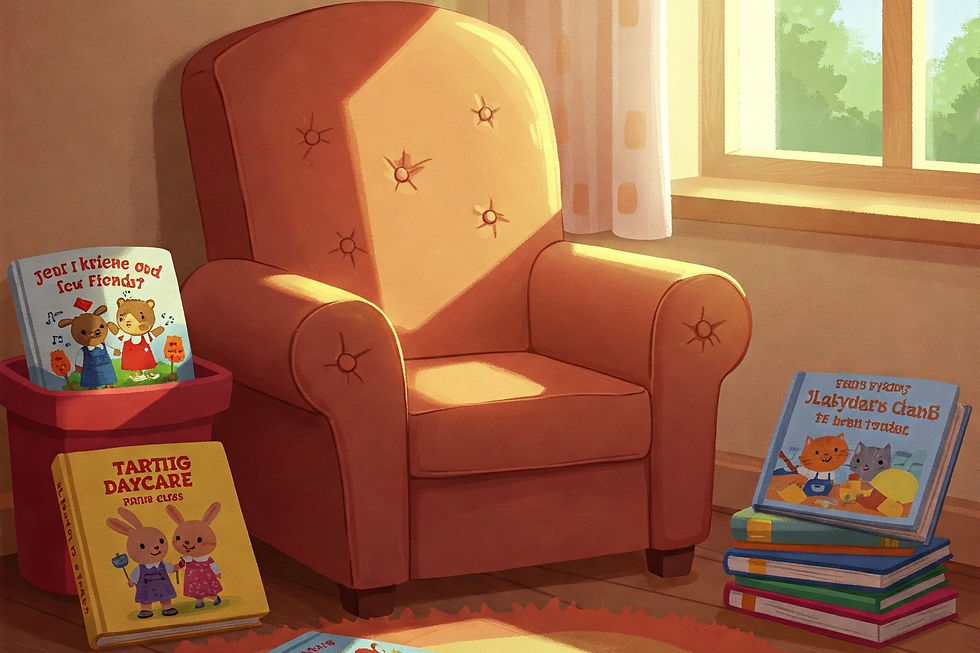Messy, Gooey, Great: Why Sensory Play Matters for Your Child's Development
- Marshall Chadbourne
- Sep 13, 2024
- 3 min read
Picture this: A toddler gleefully squishing playdough between their fingers, a preschooler giggling as they pour water from one container to another, or a group of children excitedly exploring the textures of a sand table. These aren’t just scenes of playful chaos—they’re snapshots of young minds actively learning and growing through sensory play.
Children are naturally curious explorers, eager to engage with the world around them through their senses. Touching, tasting, smelling, seeing, and hearing are all integral to how they make sense of their surroundings and build the foundation for future learning. Sensory play provides a safe and engaging space for children to unleash this curiosity, fostering a love of exploration and discovery that will last a lifetime.
But what exactly is sensory play? And why is it so crucial for a child's development? Let's dive in and uncover the magic behind the mess!
The Science Behind the Fun: It's Not Just Messy Play – It's Brain-Building Play!
While sensory play might look like simple fun and games, there's a lot of learning happening beneath the surface! Research shows that engaging the senses stimulates different parts of the brain, creating crucial neural connections that lay the groundwork for all sorts of skills. Let's break it down:
Cognitive Development: Sensory play encourages children to observe, experiment, and problem-solve. They learn about cause and effect ("If I pour water into this cup, will it overflow?"), spatial relationships ("This block fits inside this box"), and basic math concepts ("I have three blue marbles and two red ones"). Source: Early Childhood News - The Importance of Sensory Play in Child Development
Language Skills: As children describe their sensory experiences ("The sand feels soft!" or "This playdough smells like strawberries!"), they are actively building their vocabulary and communication skills. Source: NAEYC - Playdough Power
Fine and Gross Motor Skills: Squeezing, pouring, digging, and manipulating objects all contribute to strengthening those little muscles and improving hand-eye coordination. Source: Pathways.org - Sensory Play
Emotional Regulation: Sensory play can be surprisingly calming and therapeutic. Soothing textures and rhythmic movements can help children learn to self-soothe and manage their emotions. Source: The OT Toolbox - Sensory Processing and Emotional Regulation
Social Skills: When engaging in sensory play with others, children learn to share, take turns, and cooperate. They develop empathy and understanding as they observe and interact with their peers. Source: Scholastic - The Importance of Sensory Play
In essence, sensory play is like a multi-vitamin for the developing brain, nourishing a wide range of skills and abilities. It's a powerful tool for learning disguised as pure, unadulterated fun!
Sensory Play at Home: Unleashing the Magic in Your Living Room!
You don’t need a fancy classroom or a mountain of expensive toys to create meaningful sensory experiences for your child. Everyday household items and a dash of creativity can transform your home into a sensory wonderland!
Kitchen Creations:
Let your little ones explore the textures of uncooked rice, dried beans, or even oats in a large bin or bowl. Add scoops, measuring cups, and funnels for pouring and scooping fun.
Make homemade playdough or slime for a gooey, squishy good time.
Whip up some edible finger paints with yogurt and food coloring for a tasty and creative art experience.
Bathroom Bliss:
Turn bath time into a sensory adventure with bubbles, bath crayons, or even shaving cream "clouds."
Let your child experiment with different water temperatures and explore the sensation of water pouring over their hands and feet.
Nature's Playground:
Take a nature walk and collect leaves, sticks, and stones to create a sensory bin or a nature collage.
Plant a small garden or herb pot together and let your child experience the textures of soil, seeds, and growing plants.
Everyday Objects, Extraordinary Experiences:
Build a fort with blankets and pillows for a cozy, tactile hideaway.
Fill a box with crumpled paper or fabric scraps for a fun "treasure hunt."
Turn on some music and let your child move and groove to the rhythm.
Remember, the most important ingredient in any sensory experience is your child's joy and engagement. Let go of the fear of mess, follow their lead, and enjoy the journey of discovery together.
Sensory play is a powerful tool that supports children's development in a multitude of ways. By providing a variety of sensory experiences at home and choosing a daycare that values this approach, you can help your child thrive, learn, and grow in a truly holistic way. So, roll up those sleeves, embrace the mess, and let the sensory adventures begin!
At Kids & Co., we believe in the power of sensory play to nurture happy, healthy, and curious learners. We invite you to visit us and discover how we create a sensory-rich environment that fosters growth and exploration.




Comments